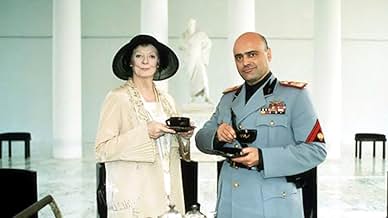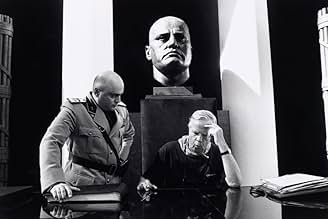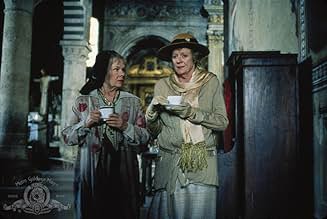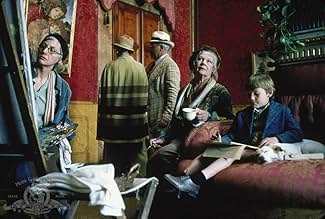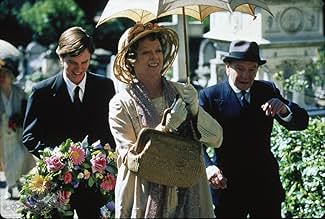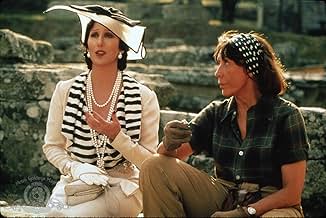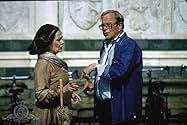CALIFICACIÓN DE IMDb
6.9/10
15 k
TU CALIFICACIÓN
Un niño italiano huérfano se cría entre un círculo de mujeres británicas y estadounidenses que vivían en la Italia de Mussolini antes y durante la II Guerra Mundial.Un niño italiano huérfano se cría entre un círculo de mujeres británicas y estadounidenses que vivían en la Italia de Mussolini antes y durante la II Guerra Mundial.Un niño italiano huérfano se cría entre un círculo de mujeres británicas y estadounidenses que vivían en la Italia de Mussolini antes y durante la II Guerra Mundial.
- Dirección
- Guionistas
- Elenco
- Ganó 1 premio BAFTA
- 5 premios ganados y 3 nominaciones en total
Opiniones destacadas
I had wanted to see this film for some time and when the opportunity finally materialised I was enthralled. It is probably the best performance I have seen by Maggie Smith, who often seems to be playing the same character actually. But this is her best since Miss Jean Brodie, and Joan Plowright, Judi Dench, Lily Tomlin and Cher are all equally impressive.
The settings are skilfully designed to draw the viewer in, and when you are setting your movie in Florence and its environs you can't go wrong anyway. The ongoing clash between two worlds i.e. Lady Hester Random (Maggie Smith) versus Elsa (Cher) reaches a satisfying resolution which it would be unfair to reveal.
There are splendid comic vignettes mixed into the overall drama. Judi Dench and her dog being thrown out of the cathedral, sharply contrasts with the chilling moment when the Jewish arts professor is taken away by the Gestapo. Understated but none the less effective, probably more so, because of it.
If you haven't seen this film, see it as soon as you can.
The settings are skilfully designed to draw the viewer in, and when you are setting your movie in Florence and its environs you can't go wrong anyway. The ongoing clash between two worlds i.e. Lady Hester Random (Maggie Smith) versus Elsa (Cher) reaches a satisfying resolution which it would be unfair to reveal.
There are splendid comic vignettes mixed into the overall drama. Judi Dench and her dog being thrown out of the cathedral, sharply contrasts with the chilling moment when the Jewish arts professor is taken away by the Gestapo. Understated but none the less effective, probably more so, because of it.
If you haven't seen this film, see it as soon as you can.
This film is directed and co-authored by Franco Zeffirelli, and I couldn't resist speculating on how much of it was actually true, since it is said to be based on Zeffirelli's autobiography. However, true in part, true completely, in the end it doesn't really matter. What matters is the amazing ensemble acting by Maggie Smith, Cher, Joan Plowwright, Judi Dench and Lily Tomlin (listing them in the order of significance to the story) and the stunning beauty of Florence where the film is set. The director and photographer plainly love the city, matching the love for it of the characters. Maggie Smith as the widow of a former British ambassador, the character that actually has tea with Mussolini, is the dominant figure in the film. However, Cher, playing a wealthy American -- vulgar in the eyes of he British ladies -- who turns out to be a complex, philanthropic Jew who must be smuggled out of the country in the end; Joan Plowwright as a kind lady who takes in the bastard son of an Italian businessman and teaches him to be an English gentleman; Judi Dench as an eccentric artist whose passion is to preserve a renaissance fresco from the Nazis during the war, and Lily Tomlin as a lesbian American archaeologist all deliver sterling performances. Cher's performance is the most amazing -- she holds her own in formidable company -- but one expects, of course, to be dazzled by Maggie Smith, Joan Plowwright, Judi Dench and even by Lily Tomlin. It's a sentimental, even melodramatic, tale, but see it for the ensemble acting. I can't think of another film that equals Tea with Mussolini in that respect.
Another Judi Dench film that in no way disappoints.
This film opens the mind even more to that important chapter in history and lets you look from various perspectives at events.
I found it a really fascinating film, absolutely beautiful cinematography.
Excellent story telling, narrative, really well paced and put across.
And wonderfully acted across the board, from main characters to all the supporting cast, I did not realise Cher was such a good actress.
Stories like this based on fact, are so wonderful.
And the movie captures Florence, so pleasingly, you will long to visit.
A welcome break from the mindless action flicks.
This film opens the mind even more to that important chapter in history and lets you look from various perspectives at events.
I found it a really fascinating film, absolutely beautiful cinematography.
Excellent story telling, narrative, really well paced and put across.
And wonderfully acted across the board, from main characters to all the supporting cast, I did not realise Cher was such a good actress.
Stories like this based on fact, are so wonderful.
And the movie captures Florence, so pleasingly, you will long to visit.
A welcome break from the mindless action flicks.
This film could have been titled 'four crazy grannies' for the marvelous portrayal of little old ladies, each more eccentric than the next. Like the comedy team of Matthau and Lemon, Dench, Smith and Plowright have a chemistry that is explosive.
Maggie Smith played a role that she has spent a lifetime perfecting. She captivates us as a snobbish dowager, tantalizes us with her improbable tea party and brings us to tears when she demonstrates her capacity to grow.
Although she may not have wowed us with her Shakespeare, Joan Plowright's compassion for her sudden charge made me wish (that at age 32) she would adopt me. Her love of the classics, remind us that art, literature and friends can help us transcend life's constant miseries.
Cher demonstrated that she could act in any time period. While Dame Judi Dench (not allowing herself to be typecast as a Queen) portrays a particularly pitiful creature as an aging artist with more passion than talent.
This film sends a clear message to Hollywood: experience and talent win out over T&A.
Applause at the end of this movie is to be expected.
Brava!
Maggie Smith played a role that she has spent a lifetime perfecting. She captivates us as a snobbish dowager, tantalizes us with her improbable tea party and brings us to tears when she demonstrates her capacity to grow.
Although she may not have wowed us with her Shakespeare, Joan Plowright's compassion for her sudden charge made me wish (that at age 32) she would adopt me. Her love of the classics, remind us that art, literature and friends can help us transcend life's constant miseries.
Cher demonstrated that she could act in any time period. While Dame Judi Dench (not allowing herself to be typecast as a Queen) portrays a particularly pitiful creature as an aging artist with more passion than talent.
This film sends a clear message to Hollywood: experience and talent win out over T&A.
Applause at the end of this movie is to be expected.
Brava!
It's certainly not clear how fictionalized a version of Zeffirelli's autobiography "Tea With Mussolini" is, what with the usual disclaimers at the end. Even presuming this is just a riff off an incident in his life, that he had some contact with memorable English ladies, it's clearly his tribute to where his love of English literature comes from, particularly Shakespeare. He's done several Shakespeare interpretations-- movies, opera and play directing. The film has a lovely scene of him being first introduced to acting out "Romeo & Juliet" with puppets, as well as constant quotes from Shakespeare throughout about war and his situation.
I was surprised how good the movie was - I was in tears several times, especially with visuals that bring up the same comparisons as "The Train" did, with art vs. war, humanity's heights of creativity vs. its lows of prejudice and violence.
These Oscar-winning ladies are absolutely terrific, yes including Cher. One elderly gentleman behind me complained that Maggie Smith basically always plays the same character but I thought her character does change towards the end. The others were certainly not their usual on-screen personas, Judi Dench as a free-spirited artist, Joan Plowright as a quite warm-hearted grandmotherly type, and Lily Tomlin a hoot as a butch archaeologist.
But why choose bland Italian actors for them to play off of? To make the Scorpioni, as they are called, stand out more? The Italians seemed stereotyped to me, Latin lover, ignorant peasants not appreciating their ancient artistic heritage.
What the movie also brought to mind is how few Italian movies have dealt with their fascist past as much as the French have been exploring their consciences of collaboration in film. Sure "Garden of Finzi Continis," "Two Women" and "Life Is Beautiful" show arrests, etc. but I don't get the sense of soul searching as to how did this happen here and could it again? Just because they didn't have Shakespeare and appreciate the treasures of the Uffizi as this film implies? (originally written 5/15/1999)
I was surprised how good the movie was - I was in tears several times, especially with visuals that bring up the same comparisons as "The Train" did, with art vs. war, humanity's heights of creativity vs. its lows of prejudice and violence.
These Oscar-winning ladies are absolutely terrific, yes including Cher. One elderly gentleman behind me complained that Maggie Smith basically always plays the same character but I thought her character does change towards the end. The others were certainly not their usual on-screen personas, Judi Dench as a free-spirited artist, Joan Plowright as a quite warm-hearted grandmotherly type, and Lily Tomlin a hoot as a butch archaeologist.
But why choose bland Italian actors for them to play off of? To make the Scorpioni, as they are called, stand out more? The Italians seemed stereotyped to me, Latin lover, ignorant peasants not appreciating their ancient artistic heritage.
What the movie also brought to mind is how few Italian movies have dealt with their fascist past as much as the French have been exploring their consciences of collaboration in film. Sure "Garden of Finzi Continis," "Two Women" and "Life Is Beautiful" show arrests, etc. but I don't get the sense of soul searching as to how did this happen here and could it again? Just because they didn't have Shakespeare and appreciate the treasures of the Uffizi as this film implies? (originally written 5/15/1999)
¿Sabías que…?
- TriviaCher has stated that the only reason she took the part of Elsa was because Writer and Director Franco Zeffirelli said he could only see her and no other actress in the role.
- ErroresThe tanks the Germans ride in are, in fact, U.S. Army M4 Shermans, not German-built Panzers.
- Citas
Lady Hester: The Germans and the Italians couldn't get rid of us. There is absolutely no reason why we should surrender to the Scots.
- Versiones alternativasThe MGM DVD, ISBN 0-7928-4300-2, is missing least one shot: The original tea with Mussolini scene ends with Mussolini forcing himself upon the reporter, forcing her onto his desk (i.e., he rapes her.) This DVD omits that ending and leaves the reporter's change in behavior unexplained.
- Bandas sonorasMattinata Fiorentina
Written by Giovanni D'Anzi (as D'Anzi) and Michele Galdieri (as Galdieri)
Performed by Alberto Rabagliati
Selecciones populares
Inicia sesión para calificar y agrega a la lista de videos para obtener recomendaciones personalizadas
- How long is Tea with Mussolini?Con tecnología de Alexa
Detalles
Taquilla
- Presupuesto
- USD 12,000,000 (estimado)
- Total en EE. UU. y Canadá
- USD 14,401,563
- Fin de semana de estreno en EE. UU. y Canadá
- USD 1,633,183
- 16 may 1999
- Total a nivel mundial
- USD 14,401,563
- Tiempo de ejecución1 hora 57 minutos
- Color
- Mezcla de sonido
- Relación de aspecto
- 1.85 : 1
Contribuir a esta página
Sugiere una edición o agrega el contenido que falta

Principales brechas de datos
By what name was Té con Mussolini (1999) officially released in India in English?
Responda

